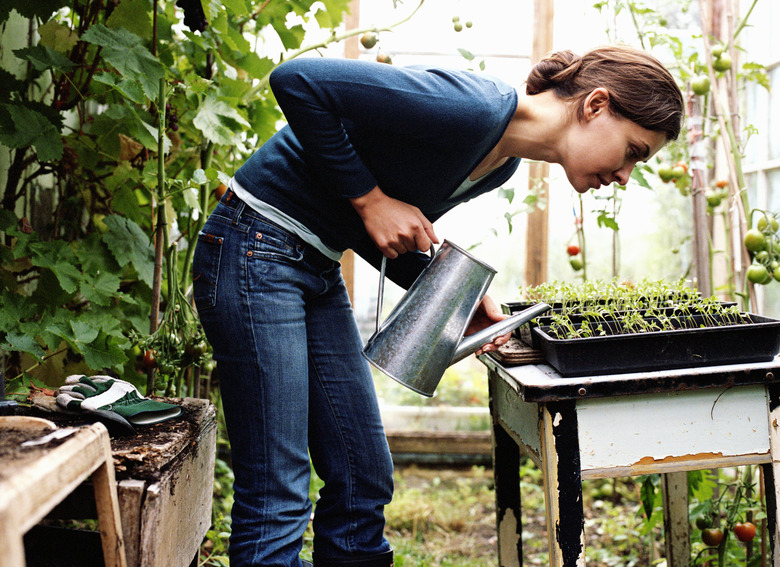Can Weather Conditions Affect Seed Germination?
The germination of seeds is one of the miracles of life. This amazing and complex biological process varies widely among species, making some seeds easy to germinate, while others germinate slowly or require special treatment. Environmental conditions, such as the weather, play a major role in the germination of different types of seed.
Temperature
Step 1
All seeds have a specific temperature range in which they germinate best. Some tend to germinate in cool weather, while others germinate best in warm weather. Most cool-season species germinate best when soil temperatures are between 55 and 70 degrees Fahrenheit, including annual lettuces (Latuca sativa), broccoli (Brassica oleracea). Some perennials also do best in cool weather, including pansies (Viola tricolor), which grow in U.S. Department of Agriculture plant hardiness zones 8 through 11 and snapdragons (Antirrhinum majus), which grow in USDA zones 9 through 11. Warm-weather annuals should be sown when soil temperatures are between 70 and 85 F, and include tomatoes (Solanum lycopoersicum), squash (Curcurbita spp.), zinnias (Zinnia elegans) and marigolds (Tagetes spp.).
- The germination of seeds is one of the miracles of life.
- Warm-weather annuals should be sown when soil temperatures are between 70 and 85 F, and include tomatoes (Solanum lycopoersicum), squash (Curcurbita spp.
- ),
Moisture
Step 1
Moisture is the key that transforms a dormant seed into a growing seedling. In nature, seeds lie dormant in dry conditions, waiting for a good soaking rain to germinate. In a garden, you can create the perfect moisture conditions through watering. In hot weather, seeds may need to be watered twice a day to germinate and grow. In cool, rainy weather, don't water the seeds — excess moisture can cause them to rot. Heavy rain can also wash away seeds that have been sown directly in the garden, preventing germination.
Light
Step 1
Some seeds require bright light to germinate, while some prefer to be buried and in darkness. Others are not as picky and will germinate either way. This is largely a matter of whether the seed should be sown on the surface — often the case with tiny seeds — or covered with soil. Constantly overcast weather can make germination slow for seeds that require bright light. These include begonias (Begonia spp.), impatiens (Impatiens spp.) and petunias (Petunia spp.). These plants are often grown as annuals, though they can be grown as perennials in USDA zones 9b through 11 for begonias, USDA zones 10 to 11 for impatiens and USDA zones 9 to 10 for petunias.
- Moisture is the key that transforms a dormant seed into a growing seedling.
- Some seeds require bright light to germinate, while some prefer to be buried and in darkness.
Winter Weather Requirements
Step 1
Though seeds cannot germinate in freezing temperatures, the seeds of many plants will not germinate until after they have been subjected cold temperatures for a specific period of time. In nature, many fruits and nuts drop to the ground in fall, lie dormant through the winter, and germinate in spring. If these seeds are collected in fall and stored indoors at room temperature, they may not germinate even if other weather conditions are right. They must be planted outdoors in fall and allowed to go through a period of cold weather naturally, or they can be packed in moist sand and refrigerated for two or three months to mimic the natural process. This is called cold stratification and is more common with the seeds of perennials, shrubs and trees than with annual plants.
